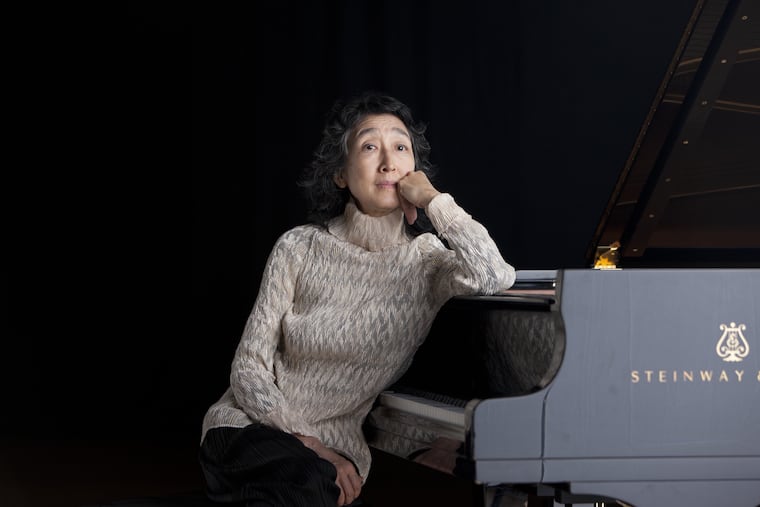Mitsuko Uchida thrills with Beethoven at sold-out Kimmel recital
The pianist will return several more times it the next year or so, making for a kind of Philadelphia mini-residency.

You don’t listen for machinelike piano technique when Mitsuko Uchida plays, nor will you find a musical personality that blazes wide, new paths.
And yet, surprises pop up in the pianist’s interpretations — revelations that change your musty old notion of how a certain phase should go. There’s considerable charisma in both her playing and her stage presence.
“She’s royalty,” my seatmate leaned over to tell me at Uchida’s Feb. 19 recital at the Kimmel Center.
Actually, at 74, with a career now surpassing a half century, she is not only a celebrity in the classical kingdom, there is no one like her.
Her presence alone for this Philadelphia Chamber Music Society concert probably would have sold out the Perelman Theater, but grouping three popular Beethoven piano sonatas into one program clinched it. The concert sold out in the fall.
Philadelphians will have a chance to hear her again soon. She appears with PCMS next season for a Die Winterreise with tenor Mark Padmore, and then in an all-Schubert four-hand, one-piano recital with Jonathan Biss. Then, late next season she performs the Ravel Piano Concerto in G with the Philadelphia Orchestra.
Uchida’s view of Beethoven’s proportions seemed to grow across the opus numbers. Part of it is the music itself, of course: the easygoing opening of the Opus 109 sonata, the craggy terrain that enters the soundscape in Opus 110, and the seemingly infinite distance of the variations from their theme in Opus 111.
But Uchida also built a sense of journey through her playing. She didn’t use her most powerful sound in Opus 109, and often settled for simplicity and serenity. If you like a pianist who takes hills with a dramatic sense of halting and pushing through, Uchida’s approach to the second movement of Opus 110 would have pleased you. For me, it seemed labored, and paled next to the sophisticated drama she brought to the last movement, alternating between a Bachian inevitability and quiet sections that revealed more vulnerability than I’ve sensed in this music before.
All led up to the second (and last) movement of Opus 111, Beethoven’s last sonata. It’s a set of variations, some so out there harmonically and rhythmically that they seem to anticipate minimalism and other genres decades in the future. But it’s close to the finish, after the section where the music grows slow and sad, where Uchida entered another realm. The music here is as euphoric a rendering of liberty in sound as any composer ever wrote, and Uchida reached the stratosphere and guided us back to earth as if only she could find an entire universe between the notes.
Mitsuko Uchida returns to PCMS next season in Schubert’s “Die Winterreise” with tenor Mark Padmore, on March 12, 2024; and with pianist Jonathan Biss, on April 5, 2024. Subscriptions go on sale March 1. pcmsconcerts.org, 215-569-8080. She also performs Ravel with the Philadelphia Orchestra from May 30-June 2, 2024. philorch.org, 215-893-1955.